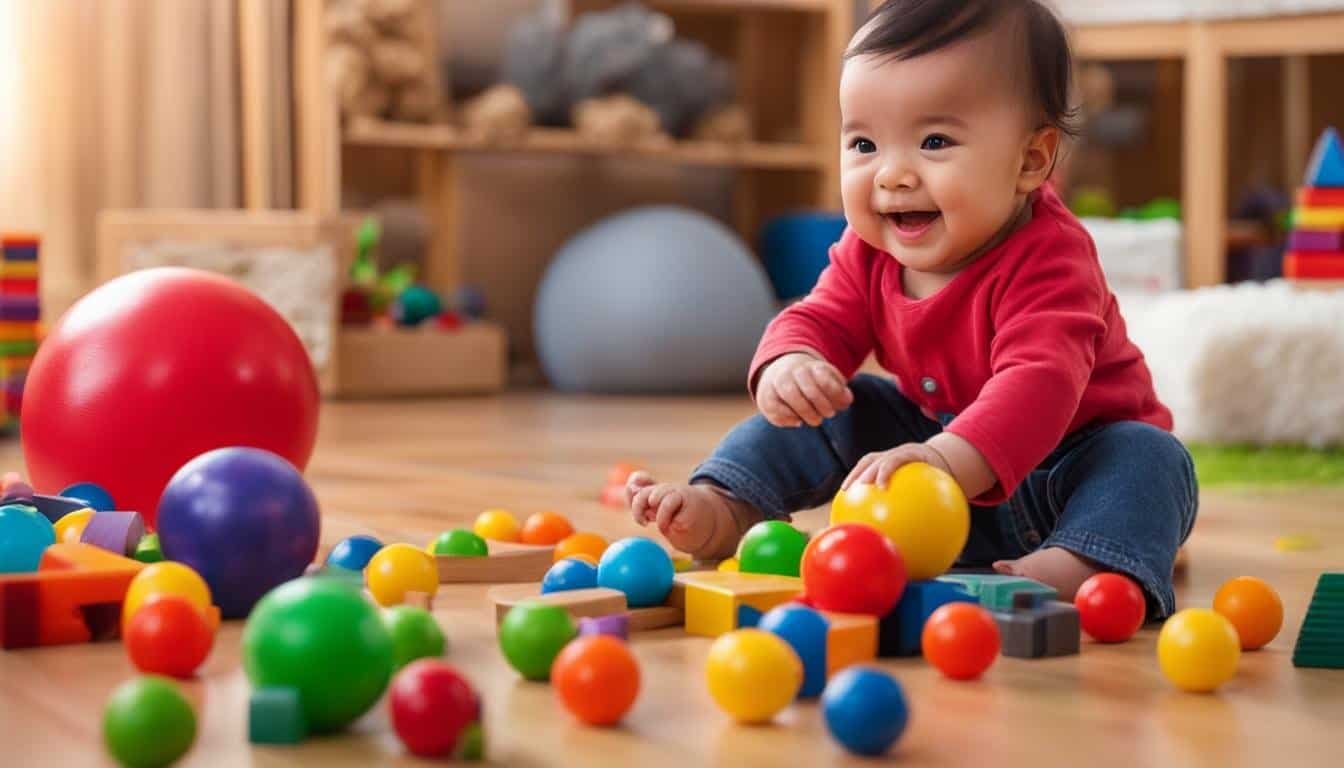Gross Motor Skills for Infants’ Activities
Gross motor skills are crucial for infants’ physical development. These skills involve large movements such as rolling over, sitting up, and walking. They require coordination and functioning muscles, bones, and nerves. Gross motor skills support the development of fine motor skills, which involve smaller, precise movements. It is important to provide infants with activities that promote their gross motor skill development as they grow and reach different milestones.
Key Takeaways:
- Gross motor skills are essential for infants’ physical development.
- Infants’ gross motor skills involve large movements like rolling over and walking.
- Activities that promote gross motor skill development are crucial for supporting infants’ physical movement.
- Gross motor skills support the development of fine motor skills.
- Providing opportunities for infants to engage in activities that promote gross motor skill development is important for their overall physical development.
What Are Gross Motor Skills?
Gross motor skills are large physical movements that infants gradually develop over time. These skills are necessary to support their body and enable them to hold their head up, sit on their own, and eventually walk.
They involve movements such as lifting legs, flexing arms, rolling over, sitting up, standing, and walking. Gross motor skills require coordination and properly functioning muscles, bones, and nerves. They are essential for continued growth and development throughout childhood.
Gross Motor Skills vs. Fine Motor Skills
| Gross Motor Skills | Fine Motor Skills |
|---|---|
| Large physical movements | Small, precise movements |
| Involve coordination of muscles, bones, and nerves | Involve coordination of smaller muscles |
| Milestones include sitting, crawling, and walking | Milestones include grasping, writing, and cutting |
Gross Motor Skills Examples by Age
Gross motor skills play a crucial role in infants’ development, gradually evolving as they grow. Each age brings new milestones and achievements for gross motor skill development in children. Here are some examples of gross motor skills milestones for infants, toddlers, and preschoolers:
Infant Gross Motor Skills
During the first year of life, infants go through significant changes in their gross motor skills. Here are some key milestones:
| Milestone |
|---|
| Improved head control |
| Sitting upright with support |
| Crawling or scooting on the belly |
| Taking their first steps with assistance |
Toddler Gross Motor Skills
As toddlers gain more confidence and independence, their gross motor skills continue to develop. Here are some milestones typically observed during the toddler years:
| Milestone |
|---|
| Walking independently |
| Running and climbing stairs with assistance |
| Jumping with two feet |
| Balancing on one foot briefly |
Preschooler Gross Motor Skills
Preschoolers continue to refine their gross motor skills and engage in more complex physical activities. Here are some milestones commonly achieved during the preschool years:
| Milestone |
|---|
| Walking up and down stairs independently |
| Running and changing direction swiftly |
| Jumping rope or skipping |
| Riding a tricycle |
It’s important to note that children develop at their own pace, so these milestones serve as general guidelines rather than strict expectations. Every child is unique and may reach these milestones at different times. Celebrate each child’s individual progress and provide appropriate support and encouragement along their gross motor skill development journey.
Activities to Encourage Gross Motor Skills Development
There are various activities that can help promote the development of gross motor skills in infants and toddlers. These activities provide opportunities for children to engage in physical movement, strengthen their muscles, and improve their coordination and balance.
Gross Motor Skills Activities for Infants:
To support the gross motor skill development of infants and older babies, the following activities can be beneficial:
- Tummy Time: Encourage your infant to spend time on their tummy, which helps strengthen their neck, back, and shoulder muscles. Place toys or objects of interest in front of them to keep them engaged.
- Sitting Support Exercises: Provide support and help your infant sit upright. You can use pillows or cushions to prop them up or sit behind them for added support.
- Crawling Games: Create fun games that encourage your baby to crawl, such as placing toys just out of their reach to motivate them to move towards them.
- Obstacle Courses: Set up simple obstacle courses using cushions, pillows, or toys to encourage your infant to navigate through them. This helps develop their coordination and balance.
Gross Motor Skills Activities for Toddlers and Preschoolers:
Toddlers and preschoolers can engage in more complex activities to further develop their gross motor skills. Some ideas include:
- Outdoor Play: Encourage your child to run, jump, climb, and play ball games outside. This allows them to explore their environment while improving their coordination and balance.
- Creative Games: Engage your child in activities like dancing, yoga, or imitation games that involve large movements. This helps enhance their motor skills while fostering creativity and imagination.
- Household Tasks: Involve your child in simple household tasks such as sweeping, raking leaves, or carrying lightweight objects. These activities provide opportunities for them to practice gross motor skills while contributing to the family.
Remember, each child develops at their own pace, so it’s important to find activities suitable for their age and abilities. Encouraging gross motor skill development through these activities can support your child’s physical growth and overall development.
| Gross Motor Skills Activities for Infants | Gross Motor Skills Activities for Toddlers and Preschoolers |
|---|---|
| Tummy Time | Outdoor Play |
| Sitting Support Exercises | Creative Games |
| Crawling Games | Household Tasks |
| Obstacle Courses |
Gross Motor Skills Delay
It is important to remember that every child develops at their own pace. While there are general milestones for gross motor skills, some children may experience a delay in reaching these milestones. It’s natural for parents to have concerns about their child’s gross motor skills development.
If you find that your child is not meeting the expected gross motor skill milestones or if you have concerns about their progress, it is recommended to speak with your pediatrician. They can assess your child’s development and provide appropriate guidance or refer you to a specialist, such as a physical therapist, for further evaluation.
Early identification and intervention are essential for addressing gross motor skills delay. Through thorough assessments and personalized interventions, healthcare professionals can help your child overcome challenges and support their motor development.
Remember, each child is unique, and some may require additional support along their developmental journey. Seeking guidance from a trusted healthcare professional will ensure that your child receives the appropriate care and intervention needed to enhance their gross motor skills and overall physical development.
The Bottom Line
Gross motor skills play a vital role in the physical development of infants. These skills support significant milestones such as sitting up, crawling, and walking. By engaging in activities that promote gross motor skill development, infants can strengthen their muscles, improve their coordination, and enhance their overall physical development.
It is crucial to understand that every child develops at their own pace. Therefore, providing support and guidance based on their individual needs and abilities is essential. By fostering an environment that encourages exploration and movement, parents and caregivers can effectively support infants in reaching their gross motor milestones.
Activities to Promote Gross Motor Skills
Here are some examples of activities that can support infant gross motor development:
- Encourage tummy time to help strengthen neck and shoulder muscles.
- Place toys just out of reach to encourage reaching and stretching.
- Create an obstacle course using pillows and cushions for crawling practice.
- Introduce toys that require pushing or pulling to promote standing and walking.
- Provide safe and spacious areas for infants to explore and practice crawling and walking.
These activities not only stimulate gross motor skills but also foster cognitive and sensory development. It is important to remember that infants progress at their own pace, so patience and encouragement are key when supporting their physical development.
| Age | Gross Motor Milestones |
|---|---|
| 0-3 months |
|
| 3-6 months |
|
| 6-9 months |
|
| 9-12 months |
|
By understanding these milestones and providing age-appropriate activities, parents and caregivers can actively support the gross motor skill development of infants, setting them on a path towards healthy physical growth and development.
Conclusion
In conclusion, gross motor skills play a vital role in the physical development of infants. These skills involve large movements that babies gradually acquire as they grow. By engaging in activities that promote the development of gross motor skills in infants, such as tummy time, sitting support exercises, and crawling games, parents and caregivers can support their little ones in strengthening their muscles and improving their coordination.
As infants continue to reach important milestones, such as sitting up, standing, and walking, promoting their gross motor skills becomes even more crucial. Providing opportunities for outdoor play, creative games, and household tasks can further enhance their physical development and help them achieve these milestones.
It is important to remember that every child develops at their own pace. While there are general guidelines for gross motor skill milestones, individual variations are normal. Parents and caregivers should be supportive and provide guidance based on each child’s unique needs and abilities. If there are any concerns about gross motor skill development, consulting with a pediatrician can provide reassurance and further guidance.







